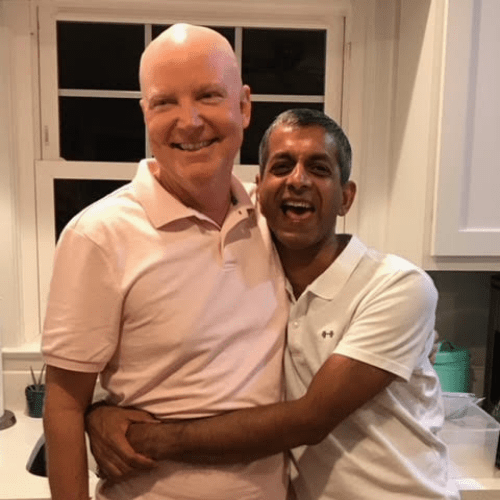
Mark Lewis, Stage III
By Mara Klecker
Mark Lewis was less than a year into his relationship when he noticed swelling in his neck. By then, he’d already undergone two scalp excisions, five years apart, to remove melanoma.
Before he got the dreaded news that the cancer was in his lymph nodes, Mark sat down with his partner, Munaf, to have a conversation about what might be next.
“I told him I knew he hadn’t signed up for this journey and I understood if he didn’t want to take this on,” Mark said.
On that day in 2017, Munaf said he wasn’t going anywhere. He’d be by Mark’s side no matter what. They’d face whatever was next and they’d face it together.
“If there were any doubts before about him being ‘the one,’ this erased them,” Mark said.
Munaf stayed true to his word, hardly leaving Mark’s side as he underwent surgery to remove two cervical (neck) lymph nodes and then four rounds of PD-1 immunotherapy, which caused his liver enzymes to skyrocket to dangerous levels. Doctors stopped the immunotherapy and put Mark on steroids, which he stayed on for the better part of the next 18 months to help resolve his liver problems.
Mark, now 62, admits he’d never seriously contemplated getting married before undergoing cancer treatments. But having a loving partner supporting him through it all helped shift his perspective and he’s now a husband. Mark and Munaf tied the knot in January 2020 and hope to have a celebratory gathering once the COVID-19 pandemic is over. For their first anniversary, they spent a weekend in the mountains of north Georgia.
“Frankly, if not for this test of our relationship, I’m not sure I ever would have married,” Mark said. “I certainly have no regrets!”
Mark’s melanoma journey goes back more than a decade, long before he met Munaf. He recently flipped through old journal entries from February 2010, when the first sample taken from a mole on his scalp was confirmed to be melanoma. Doctors didn’t assign it a stage, though it was likely Stage I.
“I am shell-shocked,” he wrote then. “I asked if there could be a mistake…”
Another entry from two days later: “Traveled to visit family and tell them about my diagnosis. It was one of the hardest things I’ve ever done, especially in light of Grady’s diagnosis last year.”
Grady Lewis, Mark’s brother, was diagnosed with Stage III melanoma in 2009. Because of his brother’s diagnosis, Mark’s dermatologist decided to, out of an abundance of caution, biopsy a mole on Mark’s scalp. For 20 years before that, Mark had been religious about seeing the dermatologist and was mindful of wearing sunscreen and hats to protect his fair skin.
“In some ways, I feel like I have my brother to thank for the fact that we caught it when we did,” Mark said.
Grady died in 2012 at age 49. He left behind a wife and two sons, one of whom is now in medical school and considering becoming a melanoma specialist.
Aside from his brother, Mark didn’t know anyone who’d had melanoma. When his own diagnosis came, Mark felt himself wondering “How did this happen” and “What do I do now?”
A friend drove him to get a wide local excision and scan results, which he wrote about in his journal, writing also that he wasn’t sure he would have been able to drive himself.
“The agony was almost unbearable, not knowing whether I was about to be handed a death sentence or a temporary reprieve.” That day, he was granted the latter: The cancer had not spread to his organs or bones.
“Considering what could have been the outcome, I felt overwhelming relief,” he wrote.
For the next five years, Mark’s scans were clear. Then, in 2015, another suspicious spot appeared on his scalp and a biopsy proved that it, too, was melanoma. Doctors were once again unsure how to stage it since it was unclear if the initial scalp excision hadn’t been wide enough or if it was in-transit metastasis. He had another scalp excision, this one requiring a skin graft.
The swelling in his neck and subsequent Stage III diagnosis, lymphadenectomy, and rounds of immunotherapy came about two years later, in 2017. Thankfully, he’s had no signs of a recurrence since then.
Still, Mark said, “there is always the underlying unease that it is lurking somewhere, just waiting to ruin your life when you finally have a few weeks of escape from it.”
These days, Mark is focused on being present in the little moments of day-to-day life – the ones he’s all the more grateful for after cancer. He and Munaf enjoy scouring thrift stores for hidden treasures and going to classic car shows. They bake together and take daily walks. Even an afternoon of pulling weeds can be a joy since it’s an afternoon spent without thoughts of doctor’s appointments or prognoses.
Now, Mark is eager to support others facing melanoma. He’s scaled back his work as a real estate agent in Atlanta, Georgia, and has more time to give back, so he signed up for AIM at Melanoma’s Peer Connect, a peer-to-peer mentoring program for those touched by the disease.
Before his own lymph node removal, Mark talked with a friend of a friend who’d undergone the same surgery after his melanoma spread.
“I was so much more at peace and less anxious after that conversation,” he said. “I’d love to be able to provide even a little bit of that to someone else,” he said.
Copyright © 2014-2022 - AIM at Melanoma Foundation. All rights reserved. Website by RED ZEPHYR DESIGN

